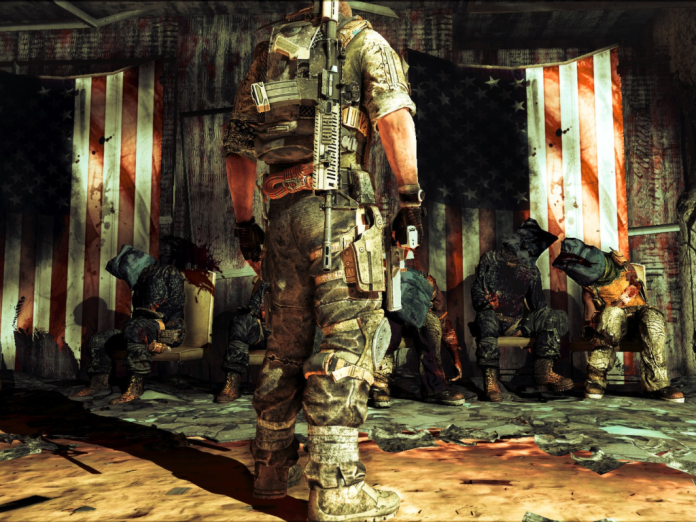
CheckMag
Released in 2012, Spec Ops: The Line looked like a typical military shooter – but beneath its dusty exterior was a brutal, introspective story that challenged players’ morality and reshaped how we view violence in video games. This is a love letter to that game.
Anubhav Sharma 👁 Published
Gaming Opinion
Views, thoughts, and opinions expressed in the text belong solely to the author.
By the time Spec Ops: The Line came out in 2012, most people had stopped paying attention to the franchise. It had roots in the late ’90s as a generic tactical shooter series, and the name wasn’t exactly unique. So when Yager Development quietly dropped a dusty third-person military shooter into the middle of a year crowded with bigger names like Call of Duty: Black Ops II and Far Cry 3, not many people expected it to leave a mark.
But The Line wasn’t trying to be another power fantasy. Scratch that, it wasn’t even trying to be fun in the traditional sense. What it ended up doing – intentionally or not – was flip the genre, burying its teeth into the player’s sense of agency and ethics in a way most games still can’t dare to attempt.
At first, Spec Ops: The Line plays it pretty safe and simple. You’re Captain Martin Walker, leading a small Delta Force team into a sandstorm-buried Dubai to track down a rogue American colonel. Controls are familiar: you take cover, issue squad commands, and unload rounds into enemy silhouettes. It looks like your standard cover-based shooter, maybe a little less polished than others in its genre. But it doesn’t take long for things to start slipping.
The narrative descent mirrors Walker’s own. He starts out with clear goals and clean motives, but as the bodies pile up, that clarity sort of fades. There’s a moment – one most players won’t forget if they’ve played the game – involving white phosphorus (see screen grab above). The game doesn’t stop to explain what you just did. It shows you. Then it forces you to sit with it.
And that’s really where Spec Ops earns its legacy. It weaponizes your expectation. Most shooters reward aggression. They glorify headshots. The Line doesn’t. It asks why you, the player, kept pushing forward even when it was clear things had gone horribly wrong. It questions whether following orders, in a game or otherwise, is ever justification enough.
Plenty of critics didn’t know what to make of it at the time. IGN gave it an 8/10 because of its storytelling, but others dinged it for clunky mechanics and (understandably) lackluster visuals. Some players were put off by how uncomfortable the whole thing felt. But over time, that became part of its identity – Spec Ops: The Line never meant to be slick or cinematic. It was just trying to make you, think.
And it did succeed. Writers and scholars have since dissected it in essays and video retrospectives. Extra Credits did a whole episode on how the game is a massive subversion in the face of shooter tropes. Game Maker’s Toolkit called it “a masterclass in narrative dissonance.” Even years later, it shows up on lists of the most underrated or impactful games ever made, and feature pieces (such as this one) pop up occasionally to remind people how great Spec Ops: The Line is.
There’s also something to be said about the way it looks and sounds. In the game, Dubai is rendered not as a postcard-perfect paradise, but as a cracked glass shell – all broken skyscrapers and sand. The color palette is sun-bleached and sickly. The soundtrack is something of a crossover between haunting, ambient tracks and classic rock to induce discomfort. Sure, it’s not slick or flashy. It’s just right for what it’s trying to do.
Then there’s Nolan North. He’s known more for quippy characters like Nathan Drake, but in this game, North delivers a solid, slow-burn performance as Walker that’s equal parts raw and unnerving. His voice starts off steady, confident, and gradually deteriorates into something completely unrecognizable. Once you notice the shift, you can’t unhear it.
A lot of people missed Spec Ops when it first launched. Commercially, it didn’t do great – Take-Two confirmed the game didn’t meet sales expectations, and Yager would later move away from traditional shooters for this reason. There’s been no sequel. No remaster. Just one singular experience that is unfortunately unavailable on any digital platform as of January 29, 2024 – when it was delisted.
It’s not a perfect game. Its combat can (and will) feel stiff, and some set pieces try too hard to match genre conventions they’re meant to critique. But flaws and all, Spec Ops: The Line is one of those rare titles that you’ll be thinking about long after you’ve finished the campaign – especially since the game doesn’t want you to win at all – it wants you to reflect. This is exactly why you can’t call it just another shooter. Thirteen years on, Spec Ops: The Line is still one of the most important – and criminally overlooked – games ever made.
Related Articles
Anubhav Sharma – Tech Writer – 858 articles published on Notebookcheck since 2024
Fueled by a childhood spent taking apart video game consoles to see how they worked, I turned my passion for tech into writing. I have a double Bachelor’s in Computer Science Engineering (2018) and English (2024). I’ve been writing on a variety of tech topics since 2016, with a particular interest in gaming. When I’m not hunting down the latest tech news, you’ll find me producing music, gaming, or hiking.
Anubhav Sharma, 2025-08- 5 (Update: 2025-08- 5)

